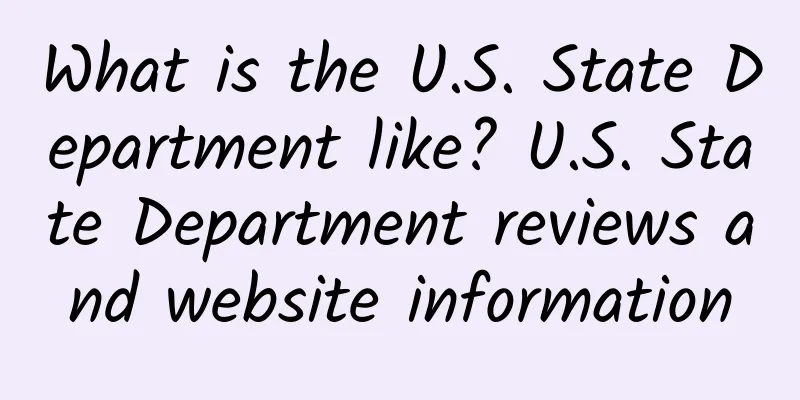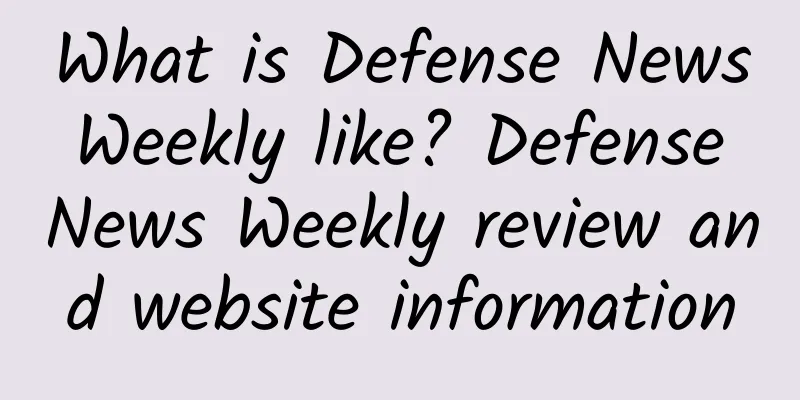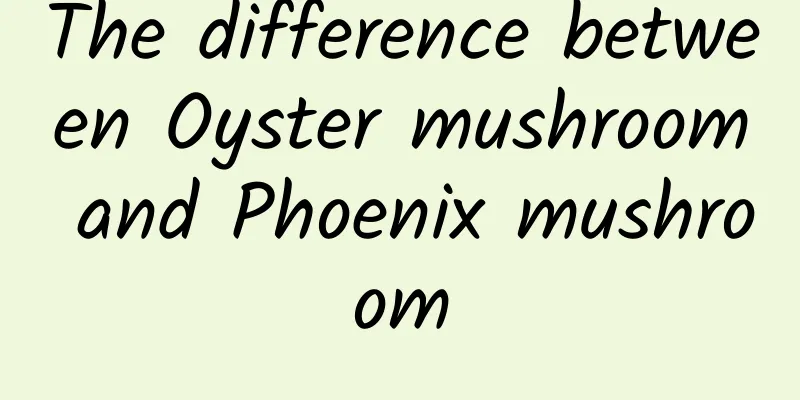What is the U.S. State Department like? U.S. State Department reviews and website information

|
What is the website of the United States Department of State? The United States Department of State is a government agency of the United States. It was established in 1789. The highest executive officer is the Secretary of State. The United States Department of State is mainly responsible for the United States' foreign affairs, which is roughly equivalent to the foreign affairs of various countries. Website: www.state.gov The U.S. State Department: The Core Hub of Diplomatic Affairs 1. The History of the U.S. State Department In 1789, the U.S. State Department came into being. Its birth was of great significance at a critical period when the new country was constantly exploring and building its own governance system. At that time, the United States had just gotten rid of British colonial rule and was trying to gain a foothold on the world stage. The handling of diplomatic affairs became crucial. The establishment of the U.S. State Department was to undertake this important task. From the very beginning, it shouldered multiple missions such as safeguarding the national interests of the United States, conducting foreign exchanges, and shaping its international image. In its early development, it faced many challenges. Diplomatic relations were complicated, and the United States needed to find its own position in an environment where European powers stood side by side. A group of outstanding figures, including the first Secretary of State Thomas Jefferson, began a difficult diplomatic exploration journey. They actively established contacts with European countries, worked hard to win trade opportunities and safeguard national sovereignty. In this process, the U.S. State Department gradually accumulated experience and traditions in handling diplomatic affairs and formed a unique diplomatic operation model. As time went on, the U.S. State Department continued to grow and develop. In the 19th century, the territory of the United States gradually expanded, and the scope of its diplomatic activities also expanded. With increasingly frequent exchanges with Latin America, Asia and other regions, the U.S. State Department plays an increasingly critical role in coordinating these foreign relations. It participates in the signing of various treaties and agreements, and promotes the gradual increase of the United States' influence in the fields of international economy and politics. 2. The Organizational Structure of the U.S. State Department The U.S. State Department has a large and complex organizational structure. The Secretary of State, the highest executive officer, is the core leader of the entire agency. The Secretary of State is appointed by the President and must be approved by the Senate. The Secretary of State plays a pivotal role in foreign policy decision-making. Not only does he provide foreign policy advice to the President, but he is also responsible for the specific implementation of foreign affairs and speaking on behalf of the U.S. government. There are many functional departments under the Secretary of State. The Bureau of Political Affairs is responsible for handling political relations with various countries, tracking international political trends, and formulating corresponding diplomatic strategies. The Bureau of Economics and Commerce focuses on economic diplomacy, promoting trade, investment and economic cooperation between the United States and other countries, and seeking benefits for the United States in the global economic landscape. The Consular Bureau is mainly responsible for protecting the rights and interests of American citizens overseas, issuing visas, and consular services, ensuring that American citizens overseas can be properly cared for and supported. In addition, there are departments responsible for public diplomacy and public affairs. Through various media channels and cultural exchange activities, they spread American values, culture and policies to the world and enhance the image and soft power of the United States in the international community. Regional bureaus are divided according to different regions of the world, such as the African Bureau, the East Asian and Pacific Bureau, the European and Eurasian Affairs Bureau, etc. Each regional bureau is responsible for in-depth research and handling of the diplomatic affairs of the region, and formulating targeted diplomatic policies and action plans based on regional characteristics. These departments cooperate with each other and check and balance each other, and together constitute an efficient system of the US State Department. Through regular meetings, information sharing and coordination mechanisms, they ensure that they can form a joint force when handling diplomatic affairs, while also avoiding decision-making errors caused by excessive concentration of power. 3. The main responsibilities of the US State Department The responsibilities of the US State Department in diplomatic affairs are extensive and diverse. The primary responsibility is to formulate and implement the US foreign policy. It must carefully plan the direction and focus of foreign exchanges based on the national interests of the United States, the international situation and the strategic intentions of the president. On the international political stage, it actively participates in multilateral and bilateral diplomatic activities, safeguards the interests of the United States through negotiations and consultations, and promotes the realization of US policy propositions. In terms of international security affairs, the US State Department plays an important coordinating role. Work closely with the Department of Defense and other departments to jointly respond to security challenges around the world. Participate in international peacekeeping operations, counter-terrorism cooperation, and prevent the proliferation of weapons of mass destruction, and strive to create an international environment conducive to the national security of the United States. Promoting economic cooperation is also one of the important tasks of the U.S. State Department. Through trade negotiations and signing economic cooperation agreements with various countries, it promotes American companies to expand overseas markets, attract foreign investment, and enhance the status of the United States in the global economic system. In global economic governance, it actively participates in the formulation and revision of international economic rules to safeguard the economic interests of the United States. Cultural exchange is also a focus of the work of the U.S. State Department. Through various cultural exchange projects, such as educational exchanges, art exhibitions, and academic cooperation, it enhances mutual understanding and friendship between the people of the United States and other countries. This not only helps to spread American culture, but also lays a good public opinion foundation for the development of diplomatic relations and promotes mutual trust and cooperation between different countries. 4. The role and influence of the U.S. State Department on the international stage The U.S. State Department has long played an important role on the international stage. As the main executive body of U.S. foreign policy, it speaks on behalf of the U.S. government worldwide and conducts extensive communication and cooperation with governments and international organizations. In multilateral international organizations such as the United Nations, the U.S. State Department actively participates in the discussion and decision-making of various agendas, and strives to promote the United States' position and interests. Its influence is reflected in many aspects. In the political field, the U.S. State Department uses diplomatic means to influence the political trends of other countries. It supports regime changes that are in line with the interests of the United States, promotes democratic reforms, and attempts to shape the international political landscape in accordance with American values and political models. In the economic field, the trade agreements and economic cooperation projects it promotes have a profound impact on the operation of the global economy and the economic relations between countries. In order to carry out economic cooperation with the United States, many countries have to adjust their own economic policies and industrial structures. In terms of culture, the U.S. State Department has spread American culture widely around the world through cultural exchange activities. American cultural products such as Hollywood movies and pop music are popular all over the world, and to a certain extent, they have shaped global cultural consumption trends and cultural concepts. This cultural influence not only enriches the diversity of global culture, but also subtly affects the perception and attitude of people in other countries towards the United States. However, the influence of the U.S. State Department is not always positive. Some of its diplomatic policies sometimes cause controversy and opposition from the international community. For example, in the Middle East, some diplomatic actions led by the U.S. State Department have been accused of exacerbating regional turmoil and conflicts. In the international public opinion field, some practices of the US State Department are often criticized, and are considered to be promoting hegemony and unilateralism, undermining the sovereignty and interests of other countries. V. Interaction between the US State Department and diplomatic agencies of other countries The US State Department maintains frequent and complex interactions with diplomatic agencies of various countries. It has close cooperative relations with diplomatic agencies of traditional allies, such as the British Foreign Office and the French Foreign Ministry. The two sides conduct regular high-level dialogues and exchanges in multiple fields such as politics, economy, and military, jointly respond to global challenges, and maintain a rules-based international order. Through intelligence sharing, joint military exercises, etc., they strengthen strategic mutual trust and coordinated combat capabilities. With the diplomatic agencies of emerging countries, the US State Department is also constantly adjusting its interaction strategy. On the one hand, it actively seeks cooperation opportunities in the fields of economy, science and technology, trying to catch the fast train of emerging countries' rapid development and share the dividends of development. On the other hand, it remains vigilant about the rise of emerging countries and uses diplomatic means to carry out a certain degree of checks and balances. On some international issues, there is both cooperation and competition with emerging countries, and efforts are made to maintain the US's dominant position in global affairs. In diplomatic interactions with developing countries, the US State Department focuses on carrying out projects such as humanitarian assistance and development cooperation. By providing financial, technical and material support, improving the infrastructure, education and medical conditions in developing countries, the United States can strengthen its relations with these countries and enhance its influence in developing countries. However, this interaction is often accompanied by the political intentions of the United States, which attempts to promote American values and political models in the process of aid. With the diplomatic agencies of international organizations, the U.S. State Department participates in cooperation and competition to varying degrees. In multilateral international organizations such as the United Nations, the U.S. State Department is an important participant, striving for the United States' voice in international rule-making and peacekeeping operations authorization through diplomatic efforts. At the same time, it will also exert influence on the decision-making and actions of international organizations based on its own interests. In some professional international organizations, the U.S. State Department will work with other countries' diplomatic agencies to promote the resolution of relevant issues and the development of cooperation projects based on the needs of specific fields. VI. Challenges and Opportunities Facing the U.S. State Department The U.S. State Department faces many severe challenges. The ever-changing international situation has made diplomatic work increasingly complex. The rise of emerging powers has broken the original balance of international power, and the United States' dominant position in global affairs has been impacted. When dealing with emerging powers, the US State Department needs to make a difficult balance between cooperation and competition, safeguarding the interests of the United States while avoiding direct conflicts. This places extremely high demands on its diplomatic wisdom and strategic adjustment capabilities. The recurring regional conflicts have also brought tremendous pressure to the US State Department. Wars and turmoil in the Middle East, Africa and other regions not only affect regional stability, but also pose a threat to the security and interests of the United States. The US State Department needs to carry out complex diplomatic mediation in these regions, coordinate the interests of all parties, and try to promote the peace process, but it often faces many difficulties and obstacles, and its diplomatic efforts sometimes fail to achieve the expected results. Changes in the global public opinion environment are also unfavorable to the US State Department. With the popularization of social media and the acceleration of information dissemination, some of the US State Department's foreign policies and actions are more susceptible to supervision and criticism from international public opinion. Some actions that are considered hegemonic and interventionist have caused widespread controversy in the international public opinion field, damaged the international image of the United States, and brought public opinion pressure to the US State Department's diplomatic work. However, the US State Department also faces some opportunities. The rapid development of science and technology has brought new means and methods to diplomatic work. Through the Internet, big data and other technologies, the US State Department can collect intelligence and analyze international situations more efficiently, and can also communicate and exchange with other countries more conveniently. Using social media to carry out public diplomacy activities can more accurately spread the voice and views of the United States to global audiences. The deep integration of the global economy also provides the US State Department with broad space to expand economic diplomacy. With the advancement of trade liberalization and investment facilitation, the competitiveness of American companies in the global market continues to improve. The US State Department can take advantage of this trend to further promote economic cooperation with various countries and consolidate and expand the international influence of the United States through economic means. In dealing with global issues such as climate change and public health, the US State Department also has the opportunity to strengthen cooperation with other countries, jointly find solutions, and enhance the status of the United States in global governance. VII. Future Development Trends of the US State Department Looking to the future, the US State Department is expected to be more diversified in its diplomatic means. In addition to traditional political diplomacy and economic diplomacy, cultural diplomacy, scientific and technological diplomacy, etc. will play a more important role. By strengthening cultural exchange projects, we can promote the deep integration of cultures of different countries, enhance mutual trust among the people, and lay a more solid foundation for the stable development of diplomatic relations. In the field of science and technology, the US State Department will actively promote international scientific and technological cooperation, share the United States' advanced technology and innovative achievements, and also attract outstanding scientific and technological talents from around the world to flow into the United States, enhance the United States' scientific and technological competitiveness, and thus gain an advantage in international competition. In terms of international cooperation, the US State Department may pay more attention to cooperation with emerging powers. As the influence of emerging countries on the global economic and political stage continues to grow, the US State Department has to face up to this reality and seek cooperation with emerging countries in more areas. Jointly respond to global challenges such as climate change and cybersecurity, achieve mutual benefit and win-win results through cooperation, and avoid falling into the dilemma of zero-sum game. In terms of institutional reform and innovation, the US State Department may make a series of adjustments. In order to adapt to the rapidly changing international situation and increasingly complex diplomatic tasks, it may streamline internal institutions, optimize work processes, and improve work efficiency. Strengthen research and response capacity building in emerging fields, and cultivate more diplomatic talents with interdisciplinary knowledge and international vision to better cope with various challenges in future diplomatic work. However, there are also many uncertainties in the future development of the US State Department. The polarization trend of domestic politics in the United States may have an impact on the continuity and stability of foreign policy. Differences between different political factions may make the diplomatic decision-making process more difficult and increase policy swings. The unpredictability of the international situation also makes it difficult for the US State Department to accurately grasp the future development direction. Some sudden international events may disrupt its original development rhythm, forcing it to constantly adjust its diplomatic strategy and work priorities. 8. The influence of the US State Department on US domestic politics The US State Department plays a unique role in US domestic politics. Its foreign policy decision-making process is closely linked to domestic politics. The Secretary of State needs to provide diplomatic advice to the President, and the President's foreign policy decisions are often affected by a variety of factors such as domestic political forces and interest groups. When implementing foreign policy, the US State Department also needs to coordinate and communicate with other domestic government departments and Congress, and this process is full of political games. Interest groups have an important influence on the US State Department's foreign policy. For example, military-industrial interest groups will push the US State Department to take military intervention actions in some regions to promote arms sales and military orders. Oil interest groups may influence the US State Department's energy policy in the Middle East, prompting it to maintain a regional situation that is beneficial to US oil companies. These interest groups try to influence the US State Department's decision-making through lobbying, political donations, etc., so that the foreign policy it formulates is in line with their own interests. Congress also has strict supervision over the US State Department. Congress restricts the work of the State Department through legislation, appropriations and other means. In terms of diplomatic budget, Congress has the power to determine the amount of funds that the State Department can obtain, which directly affects the implementation of various diplomatic work of the State Department. Congress will also review and hold hearings on foreign policy, and require State Department officials to explain and illustrate the purpose and effect of diplomatic actions, so as to ensure that the diplomatic work of the State Department is in line with the national interests and domestic political needs of the United States. The foreign policy of the US State Department will also affect domestic politics in turn. Successful diplomatic actions can increase the support rate of the president and the government and enhance national cohesion. For example, major diplomatic achievements in international affairs, such as signing favorable trade agreements and promoting the resolution of international issues, will be regarded as the government's achievements and help consolidate the position of the ruling party. On the contrary, failed diplomatic actions may cause dissatisfaction and criticism from the domestic people, have a negative impact on the image and support rate of the government, and may even lead to changes in the political landscape. IX. The role of the US State Department in cultural communication and exchange The US State Department plays a pivotal role in cultural communication and exchange. By establishing various cultural exchange programs, such as the Fulbright Program, it funds American students and scholars to exchange and study in other countries, and also invites foreign students and scholars to study in the United States. These exchange activities have promoted the sharing of educational resources between different countries and cultivated a group of talents with international vision and cross-cultural communication ability. In the field of culture and art, the US State Department actively promotes American cultural products to the world. It supports the global distribution and promotion of Hollywood movies and organizes American art exhibitions, concerts and other cultural activities to tour internationally. These cultural products not only bring economic benefits, but more importantly, spread American values, lifestyles and cultural concepts. The US State Department also focuses on improving the recognition and understanding of American culture by people in other countries through educational assistance and cultural training. It carries out English teaching projects in some developing countries, promotes the American education model and curriculum system, and cultivates talents with pro-American tendencies. Through these cultural communication and exchange activities, the US State Department attempts to shape the cultural image of the United States on a global scale, enhance the appeal and influence of American culture, and thus enhance the soft power of the United States in the international community. X. The role and measures of the US State Department in international economic cooperation In international economic cooperation, the US State Department plays an active role as a promoter. It participates in the negotiation and signing of international trade agreements and strives to create favorable conditions for American companies to expand overseas markets. For example, when negotiating free trade agreements with other countries, the U.S. State Department will consider political, economic, strategic and other perspectives, and strive to include clauses in the agreement that are beneficial to the United States, such as market access, intellectual property protection, and investment liberalization. The U.S. State Department also promotes international investment through diplomatic means. It encourages American companies to invest and set up factories overseas, while also attracting foreign investment into the United States. It communicates and coordinates with the governments of other countries to solve problems and obstacles encountered in the investment process and create a stable, transparent and fair investment environment. In some emerging market countries, the U.S. State Department will actively promote the signing of bilateral investment agreements to provide legal protection for overseas investments of American companies. In terms of global economic governance, the U.S. State Department actively participates in the decision-making process of international economic organizations. In international financial institutions such as the International Monetary Fund and the World Bank, the United States, relying on its economic strength and political influence, strives for greater voice and promotes the development of international economic rules in a direction that is beneficial to the United States. Through these measures, the U.S. State Department attempts to ensure that the United States occupies a dominant position in international economic cooperation and safeguards the economic interests of the United States. XI. The actions and strategies of the U.S. State Department in dealing with global issues In dealing with global issues, the U.S. State Department has taken a series of actions and strategies. On the issue of climate change, the US State Department participates in international climate negotiations and tries to secure clauses in international climate agreements that are in the interests of the United States. It promotes adjustments to domestic energy policies in the United States and encourages the development of clean energy technologies. It also pays attention to the emission reduction actions of other countries and uses diplomatic means to urge other countries to assume corresponding emission reduction responsibilities. In the field of public health, the US State Department responded relatively slowly in the early stages of the epidemic, but as the epidemic spread, it also began to actively participate in international anti-epidemic cooperation. It shares anti-epidemic experience and medical supplies with other countries and coordinates the international community to jointly respond to the challenges of the epidemic. However, in the process of fighting the epidemic, the US State Department also has some controversial practices, such as restricting the export of medical supplies and accusing other countries of ineffective anti-epidemic measures, which have aroused dissatisfaction from the international community. In terms of cybersecurity, the US State Department regards it as an important diplomatic issue. On the one hand, it strengthens cybersecurity dialogue and cooperation with other countries to jointly deal with cyber attacks, data leaks and other issues. On the other hand, it also accuses some countries of conducting cyber espionage and puts pressure on relevant countries through diplomatic means in an attempt to maintain the United States' dominant position in cyberspace. When dealing with global issues, the US State Department often formulates action strategies based on its own interests. Sometimes it emphasizes multilateral cooperation and uses the power of international organizations and other countries to jointly solve problems; sometimes it takes unilateral actions and promotes related work according to its own will and pace. This double standard approach has caused a lot of controversy in the international community. 12. The diplomatic style and characteristics of the US State Department The diplomatic style of the US State Department has distinct characteristics. First, it emphasizes power diplomacy. Relying on the strong economic, military and technological strength of the United States, it takes a tough stance in international affairs. In diplomatic negotiations, it often uses strength as a backing to require other countries to act in accordance with the wishes of the United States. For example, in trade negotiations, if the other party does not meet the requirements of the United States, the United States may take trade sanctions such as tariffs to force the other party to make concessions. Second, it has a strong ideological color. The US State Department often promotes American values and political systems in its diplomatic activities. When supporting regime change or promoting democratic reforms in some countries, there are often strong ideological factors behind it. It tries to impose American values such as democracy and freedom on other countries in order to shape an international political pattern that is in line with the interests of the United States. Third, the diplomatic means are flexible and diverse. It uses a variety of means such as politics, economy, military, and culture to achieve diplomatic goals. When dealing with relations with other countries, different strategies are adopted according to different situations. For allies, political support and military protection are given, while economic cooperation is strengthened; for competitors, containment and suppression are adopted; for developing countries, political influence is exerted while providing economic assistance. Fourth, the United States attaches great importance to maintaining the national interests of the United States. In the process of diplomatic decision-making, the national interests of the United States are always taken as the primary consideration. Whether in international politics, economy or security affairs, as long as the interests of the United States are involved, firm actions will be taken to safeguard them. This self-interest-centered diplomatic style makes the U.S. State Department sometimes ignore the interests of other countries and the overall interests of the international community in international affairs. 13. The relationship between the U.S. State Department and the U.S. intelligence agencies There is a complex and close relationship between the U.S. State Department and the U.S. intelligence agencies. Intelligence agencies provide important intelligence support for the State Department's diplomatic decision-making. By collecting and analyzing political, economic, military, social and other intelligence information from all over the world, it provides a basis for the State Department to understand the international situation, assess diplomatic risks and formulate diplomatic strategies. When conducting diplomatic activities, the State Department needs to rely on accurate intelligence provided by intelligence agencies to judge the intentions and strength of the other party, so as to make more informed decisions. For example, before conducting diplomatic negotiations with other countries, intelligence agencies will conduct in-depth analysis of the other party's negotiation bottom line, domestic political situation, possible strategies, etc., and form intelligence reports for the State Council's reference. When dealing with international crises, the real-time intelligence monitoring and analysis of intelligence agencies can help the State Council to grasp the development of the situation in a timely manner and make rapid response measures. At the same time, the State Council will also feedback the needs and information of diplomatic work to the intelligence agencies. In diplomatic practice, diplomats of the State Council will be exposed to various first-hand information, which is of great value to intelligence agencies. Through communication and cooperation with the State Council, intelligence agencies can have a more comprehensive understanding of the dynamics of the international community, adjust the focus of intelligence collection and analysis, and improve the pertinence and effectiveness of intelligence work. However, there are also certain contradictions and differences between the two. Intelligence agencies sometimes take some more covert means to obtain intelligence from the perspective of national security, and these actions may cause diplomatic disputes. The State Council pays more attention to the maintenance and development of diplomatic relations, and needs to balance intelligence work and diplomatic image. In addition, the two may have different opinions on resource allocation and work priorities, and need to resolve differences through coordination mechanisms to ensure that they can form a joint force and serve the diplomatic and national security goals of the United States. 14. The performance of the U.S. State Department in major historical events The performance of the U.S. State Department in major historical events has attracted much attention. During World War II, the U.S. State Department played an important role in promoting the United States' participation in the war and the reconstruction of the post-war international order. It actively participated in diplomatic mediation, worked closely with the Allies, and coordinated the allocation and use of war resources. After the war, it led the creation of international organizations such as the United Nations, trying to safeguard the interests of the United States and world peace by establishing a new international order. During the Cold War, the U.S. State Department was one of the core executive agencies of the United States' foreign policy. It promoted the policy of containing the Soviet Union and encircled the Soviet Union and its allies through diplomatic, economic, and military means. In Europe, it implemented the Marshall Plan to help European countries restore their economies and strengthen relations with European allies to counter the influence of the Soviet Union. In Asia, it actively participated in military conflicts such as the Korean War and the Vietnam War, trying to prevent the expansion of communist forces. In the conflicts in the Middle East, the U.S. State Department played a complex role. On the one hand, it worked hard to promote the peace process in the Middle East, conducted diplomatic mediation, and tried to ease regional tensions. On the other hand, due to factors such as the U.S.'s oil interests in the Middle East, it took a biased position in some conflicts, exacerbating regional instability. For example, in the Israeli-Palestinian conflict, the US State Department has been working hard to promote peace talks between the two sides for many years, but due to the complex contradictions between Israel and Palestine and the influence of pro-Israel forces in the United States, the peace process has been repeatedly frustrated. In the process of accelerating globalization, the US State Department actively promotes international trade liberalization and investment facilitation. Participating in multilateral trade negotiations and signing a series of trade agreements have promoted the integration and development of the global economy. But at the same time, it has also taken some protectionist measures in trade policy, which has triggered trade frictions with other countries and had a certain impact on the global economic order. 15. The exploration and practice of the US State Department in cyber diplomacy With the advent of the Internet era, the US State Department has actively carried out exploration and practice of cyber diplomacy. Using social media platforms such as Twitter and Facebook, it releases US foreign policy information and promotes the image of the United States. Through live broadcasts of diplomatic activities and the release of diplomatic documents, it enhances interaction and communication with global netizens, trying to break the information barriers of traditional diplomacy and let more people understand the diplomatic stance and actions of the United States. In terms of cyber security diplomacy, the US State Department strengthens dialogue and cooperation with other countries. It holds international conferences on cyber security and invites representatives from various countries to discuss cyber security issues and seek to establish international cyber security rules and standards. At the same time, it also accuses and sanctions some countries that are considered to pose cybersecurity threats, trying to maintain the United States' dominant position in cyberspace through diplomatic means. The U.S. State Department also uses network technology to improve the efficiency of diplomatic work. By establishing an electronic diplomatic platform, it realizes the electronic transmission of diplomatic documents and online diplomatic negotiations, thereby improving the convenience and timeliness of diplomatic work. When dealing with international affairs, it can communicate and coordinate with various countries more quickly, grasp the changes in the international situation in a timely manner, and make more rapid diplomatic decisions. However, the cyber diplomacy of the U.S. State Department also faces many challenges. The authenticity and reliability of network information are difficult to guarantee, and the information released by the U.S. State Department on the Internet is sometimes questioned and misunderstood. Cyber attacks and hacking incidents also pose a threat to the security of its cyber diplomacy platform. In addition, different countries have different interests and values in cyberspace. The cyber diplomatic initiatives of the U.S. State Department are sometimes difficult to be recognized and cooperated by other countries, and face a complex game situation in the governance of international cyberspace. 16. The inheritance and development of the U.S. diplomatic heritage by the U.S. State Department The U.S. State Department has inherited the diplomatic tradition and heritage of the United States since its founding. Early U.S. diplomacy emphasized the balance between isolationism and expansionism, with different emphases in different historical stages. In the subsequent development, the U.S. State Department has continuously adjusted and applied these traditions according to the changes in the international situation and the national interests of the United States. During the period of territorial expansion, the U.S. State Department actively promoted external territorial expansion and acquired new land through diplomatic negotiations, wars and other means. As the United States has become a world power, the sense of responsibility of a great power in its diplomatic legacy has gradually become prominent. The U.S. State Department has assumed more responsibilities in maintaining international order and promoting global cooperation in international affairs. In terms of diplomatic concepts, the U.S. State Department has inherited the tradition of emphasizing the spread of democratic and liberal values. During the Cold War, it was used as an important ideological tool to confront the Soviet Union. In today's era, it continues to promote American-style democracy and values around the world through cultural exchanges, diplomatic aid and other means, trying to use this to shape an international political and cultural environment that is beneficial to the United States. At the same time, the U.S. State Department is also constantly developing and innovating the U.S. diplomatic legacy. In terms of diplomatic means, it has expanded from traditional political diplomacy and military diplomacy to economic diplomacy, cultural diplomacy, cyber diplomacy and other fields. In terms of international cooperation models, it has gradually shifted from unilateralism to a combination of multilateralism and unilateralism, and flexibly adjusted cooperation strategies according to different issues and situations. Through these inheritances and developments, the U.S. State Department strives to maintain the influence of the United States on the international diplomatic stage, continue the glorious history of American diplomacy, and lay a solid foundation for the future diplomatic cause of the United States. As the core agency of American diplomatic affairs, the U.S. State Department has experienced countless challenges and opportunities in its long development history, and has continuously shaped the image and status of the United States on the international stage. Its history, organizational structure, responsibilities, influence, and actions in various fields have profoundly influenced the political, economic, and cultural landscape of the United States and even the world. In the future, the U.S. State Department will continue to move forward in a complex and changing international environment. Its development trend deserves our continued attention, and its interactions with countries around the world will continue to shape the direction of international relations. |
<<: How is Shanyue.com? Shanyue.com review and website information
>>: How is Hublot? Hublot reviews and website information
Recommend
What are the disadvantages of chewing bubble gum?
Chewing bubble gum can freshen your breath, espec...
How to eat rhubarb rice? How to eat rhubarb rice
Rhubarb rice is a traditional Chinese rice ingred...
The efficacy and function of red beans and black beans
Red beans and black beans have become very common...
The benefits of spinach porridge
How much do you know about the effects of spinach ...
How is the French DCNS Group? French DCNS Group reviews and website information
What is the website of the French DCNS Group? DCNS...
The efficacy and nutritional value of barley and mung bean porridge
Usually, many people like to cook porridge with b...
The efficacy and medicinal value of ginger flower
Ginger flower, a freshwater herb of the Zingibera...
Kiwi porridge
How much do you know about kiwi porridge? Let me ...
How to make pea yellow
Today I have nothing to do, so I will introduce t...
The efficacy and function of Paulownia flowers
Paulownia flower is a tree of the Scrophulariacea...
What is Patek Philippe like? Patek Philippe reviews and website information
What is Patek Philippe? Patek Philippe (PP for sho...
How to eat Buddha's head fruit? How to eat Buddha's head fruit?
Buddha's head fruit is a common fruit in trop...
How to eat jujube in a healthy way
Jujube is a common food in life. Whether it is ea...
Icy Watermelon Balls
Icy watermelon balls are famous for their coolnes...
The efficacy and function of pear enzymes The benefits of eating pear enzymes
Pears are a very nutritious fruit that can be eat...









